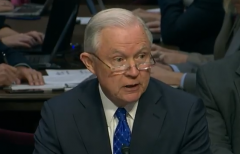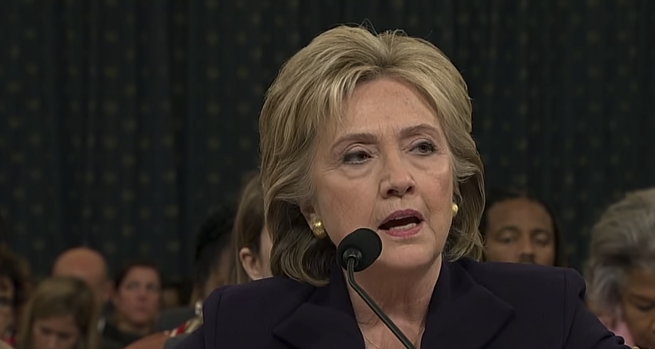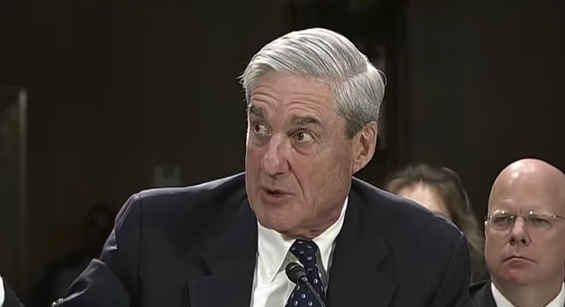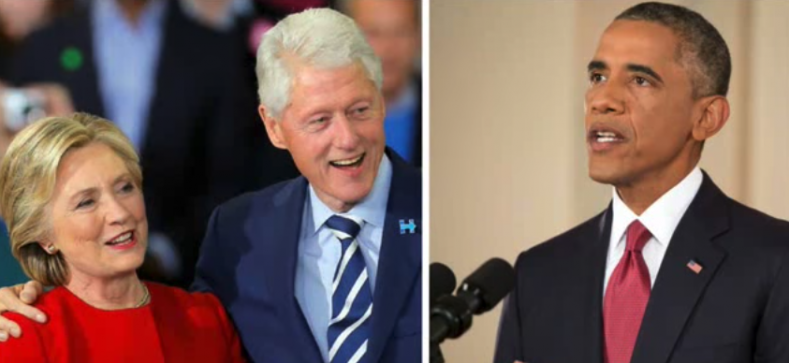 Attorney General Jeff Sessions could lift the gag order on an informant who helped investigate Russian bribery and money laundering in 2009-2014 -- a case involving uranium and national security -- according to the informant's attorney, Victoria Toensing, founding partner of the law firm diGenova & Toensing in Washington, D.C.
Attorney General Jeff Sessions could lift the gag order on an informant who helped investigate Russian bribery and money laundering in 2009-2014 -- a case involving uranium and national security -- according to the informant's attorney, Victoria Toensing, founding partner of the law firm diGenova & Toensing in Washington, D.C.
As the case wound down, the FBI directed the informant to sign a Non-Disclosure Agreement (NDA), which prohibited him from speaking about the case to members of Congress. Special Counsel Robert Mueller was the FBI director during the bulk of the investigation; James Comey became director in September 2013.
According to Toensing, the Department of Justice, under the Obama administration, told the informant that if he violated the NDA, "he would lose his liberty." Toensing told CNSNews.com that she had never heard of an NDA "that had a criminal penalty for violation," and that the penalty is "usually monetary."

Former Secretary of State Hillary Clinton. (YouTube)
She further said "the Obama administration did not comply with a FOIA request from my client's" previous attorney, and that "the FBI did not give him a copy [of the NDA] when he signed it."
The case is important because, despite the FBI evidence of Russian corruption on U.S. soil -- evidence largely collected in 2009-10 with the help of the informant -- the Obama administration approved the partial sale of a company, Uranium One, to a Russian-state entity, Rosatom, in October 2010 (Rosatom is the Russian equivalent of the U.S. Department of Energy.) That sale gave Russia (and President Vladimir Putin) control over 20% of the uranium production in the United States.
In addition, as the sale was ongoing in stages, the chairman of Uranium One made donations to the Clinton Foundation totaling $2.35 million, reported The New York Times, and then-Secretary of State Hillary Clinton sat on a committee, as did then-Attorney General Eric Holder, that had to approve the sale -- the Committee on Foreign Investment in the United States (CFIUS).
Those donations "were not publicly disclosed by the Clintons, despite an agreement Mrs. Clinton had struck with the Obama White House to publicly identify all donors," reported The Times, which added that other people connected to Uranium One also made donations to the Clinton Foundation.
On a related note, after Russian officials "announced their intention to acquire a majority stake in Uranium One, Mr. [Bill] Clinton received $500,000 for a Moscow speech from a Russian investment bank with links to the Kremlin that was promoting Uranium One stock," said The Times.

Attorney Victoria Toensing. (Screenshot: YouTube)
The bribery, kickbacks, and money laundering case itself involved Vadim Mikerin, who was the director of TENEX. This company is "a subsidiary of Russia's State Atomic Energy Corporation [Rosatom] and the sole supplier and exporter of Russian Federation uranium and uranium enrichment services to nuclear power companies worldwide," according to the U.S. Department of Justice in a Dec. 15, 2015 press release.
Mikerin was also the president of TENAM Corporation, said the DOJ, which is "a wholly owned subsidiary and the official representative of TENEX.
The other people involved in the case are Daren Condrey and Boris Rubizhevsky. Condrey ran Transport Logistics International, which transported uranium from Russia to the United States, and Rubizhevsky ran NexGen Security Corporation, which functioned as a consultant to Mikerin and TENAM.
The way it worked is that Mikerin would arrange for uranium transportation contracts to be awarded to TLI and then TLI would pay Mikerin a kickback. Rubizhevsky served as middleman to accept the kickback payments for Mikerin, according to a press release from the U.S. Attorney's Office in Maryland.
"Mikerin conspired with Condrey, Rubizhevsky and others to transfer approximately $2,126,622 from the United States to offshore shell company bank accounts," said the Department of Justice in an Aug. 31, 2015 press release.
According to the DOJ, Mikerin pleaded guilty to conspiracy to commit money laundering in violation of the Foreign Corrupt Practices Act (FCPA) and was sentenced to 48 months in prison on Dec. 15, 2015. Condrey pleaded guilty to conspiracy to violate the FCPA and conspiracy to commit wire fraud; Rubizhevsky pleaded guilty to conspiracy to commit money laundering.

Former FBI Director Robert Mueller, now Special Counsel. (YouTube)
The lead investigators on the case included Rod Rosenstein, who is now the deputy attorney general, and Andrew McCabe, who is now the deputy FBI director. Rosenstein is the DOJ official who appointed former FBI Director Robert Mueller to investigate alleged collusion between the Trump presidential campaign and Russia.
Attorney General Jeff Sessions recused himself from the collusion/campaign investigation. He could waive the Non-Disclosure Agreement (NDA) signed by the informant, said Toensing. "Yes, Jeff could do it," she said. "He is not recused from this matter and should not be."
However, Rod Rosenstein "is conflicted," said Toensing, "because he was the U.S. attorney who oversaw the case involving my client." Toensing added that she has "asked an oversight committee to pursue the release" of the NDA so her client may testify before Congress about what he knows.
Apparently, neither the FBI nor the DOJ informed the members of the CFIUS panel of the Russian bribery and kickbacks involving uranium transportation in the United States prior to the committee approving the sale of Uranium One to Rosatom in October 2010. In fact, charges were not made against Mikerin and the other parties until 2014.
Further, Toensing told The Hill that her client attempted to file a lawsuit in 2016 "that could have drawn attention to the Russian corruption during the 2016 presidential race" but the Justice Department threatened the informant. The undercover client saw "a lot of bribery going on around the U.S.," but the NDA prevented the person from informing Congress, said Toensing.

Hillary Clinton, President Bill Clinton, and President Barack Obama. (YouTube)
"The information the client possesses includes specific allegations that Russian executives made to him about how they facilitated the Obama administration's 2010 approval of the Uranium One deal and sent millions of dollars in Russian nuclear funds to the U.S. to an entity assisting Bill Clinton's foundation," reported The Hill. "At the time, Hillary Clinton was serving as secretary of State on the government panel that approved the deal, the lawyer said."
It was reported on Wednesday that the Senate Judiciary Committee has demanded that 10 federal agencies disclose whether they knew of the Russian bribery investigation before the Obama administration approved the sale of Uranium One in 2010.
www.cnsnews.com, October 18, 2017




